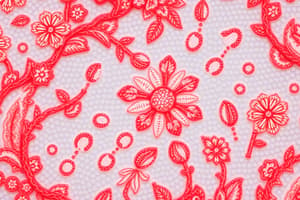Podcast
Questions and Answers
What is the primary function of epithelial tissue in animals?
What is the primary function of epithelial tissue in animals?
- Supporting and binding other tissues
- Providing protection and absorption or secretion (correct)
- Forming blood vessels
- Contractile functions responsible for movement
What are the types of muscle tissues found in animals?
What are the types of muscle tissues found in animals?
- Simple, cuboidal, and squamous
- Skeletal, smooth, and cardiac (correct)
- Columnar, ciliated, and stratified
- Epithelial, connective, and nervous
Which type of tissue is responsible for supporting and binding other tissues in animals?
Which type of tissue is responsible for supporting and binding other tissues in animals?
- Epithelial
- Muscle
- Nervous
- Connective (correct)
Which tissue type is primarily found lining body surfaces such as skin and internal organs in animals?
Which tissue type is primarily found lining body surfaces such as skin and internal organs in animals?
In what kind of animals can tissues be found?
In what kind of animals can tissues be found?
Which tissue type forms blood vessels in animals?
Which tissue type forms blood vessels in animals?
Which type of connective tissue surrounds most organs and glands?
Which type of connective tissue surrounds most organs and glands?
What specialized cells produce collagen, elastin, and proteoglycans in connective tissue?
What specialized cells produce collagen, elastin, and proteoglycans in connective tissue?
Which type of muscle moves limbs and other parts of the body under voluntary control?
Which type of muscle moves limbs and other parts of the body under voluntary control?
Where are dense regular connective tissues like tendons and ligaments found?
Where are dense regular connective tissues like tendons and ligaments found?
Which type of muscle contracts involuntarily and controls movements below conscious awareness?
Which type of muscle contracts involuntarily and controls movements below conscious awareness?
What is the primary role of the nervous system in the body?
What is the primary role of the nervous system in the body?
Flashcards are hidden until you start studying
Study Notes
Tissue Overview and Animal Tissues
Tissue is defined as a group of cells with similar structure and function organized together to perform specific tasks within organisms. This fundamental unit of life can be found throughout all living beings, from single-celled microorganisms to complex multicellular organisms like animals and plants. In the context of this article, we will focus primarily on tissue types found in animals.
There are four main types of tissues in animals:
- Epithelial - Found lining body surfaces such as skin and internal organs; provides barrier functions and secretions.
- Connective - Supports and binds other tissues, stores nutrients, forms blood vessels. Examples are bone, cartilage, tendon, and fat.
- Muscle - Contractile tissues responsible for movement, posture, and maintaining bodily form. Types of muscle are skeletal, smooth, and cardiac.
- Nervous - Central nervous system components, including brain and spinal cord, as well as sensory receptors, neurons, and synapses.
The epithelium, also known as surface tissue, serves two primary purposes: protection and absorption or secretion. It lines cavities and covers external surfaces, providing a protective barrier against harmful substances while allowing essential exchanges to occur. Epithelia can be stratified or simple, cuboidal, columnar, squamous, or ciliated depending on their location in the body and function they perform.
Connective tissue plays several crucial roles in supporting and connecting various structures inside the body. It includes specialized cells called fibroblasts that produce collagen, elastin, and proteoglycans which give connective tissue its strength and flexibility. There are three major classes of connective tissue: loose, dense regular, and dense irregular. Loose connective tissue surrounds most organs and glands, whereas dense regular connective tissue forms tendons, ligaments, and aponeuroses. Dense irregular connective tissues, like cartilage, protect bony prominences and fill up spaces around organs.
Animal muscles generate force through contraction and relaxation, moving bones across joints. They enable movement of the entire body, regulation of blood pressure, and general maintenance of muscular tone. Skeletal muscles move limbs and other parts of the body under voluntary control. Smooth muscles contract involuntarily, controlling movements below conscious awareness such as peristalsis and dilation of airways. Cardiac muscles, specifically found in heart walls, have unique properties allowing them to contract rhythmically without neural stimulation.
Lastly, the nervous system controls and coordinates activities within the body by transmitting signals between different regions. Nerves transmit information to and from the central nervous system, composed of the brain and the spinal cord. These nerves extend outward into peripheral nerves, relaying messages back to the CNS and within local areas. Each nerve has specialized cell types dedicated to receiving input from outside sources, processing it, responding, and sending new information along.
In summary, understanding these basic tissue types and their functions is fundamental to grasping more advanced biological concepts related to human physiology and pathophysiology.
Studying That Suits You
Use AI to generate personalized quizzes and flashcards to suit your learning preferences.




